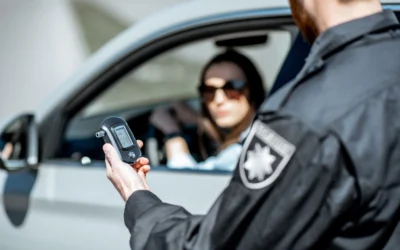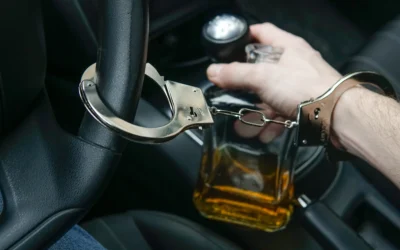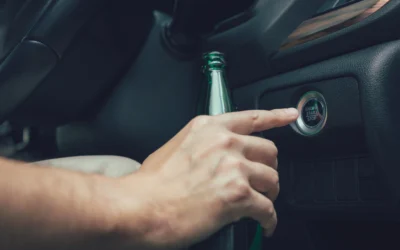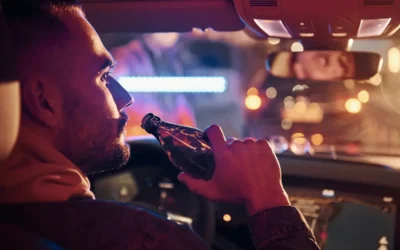The flashing red and blue lights fade in your rearview mirror as the officer returns to his patrol car. You’ve just been arrested for DUI in Nevada, and your driver’s license is already on the line. You have exactly seven days to do something about it.
When you get arrested for DUI in Nevada, you’re facing two completely separate cases. The first is the criminal case where prosecutors try to convict you in court. The second is an administrative action by the Nevada DMV that can suspend your license before you ever step foot in a courtroom. These two proceedings run on different tracks, follow different rules, and can end with completely different results.
This dual system might seem unfair, but it’s been Nevada law for decades. The challenge is that the DMV hearing has tight deadlines that catch people off guard every day.
Why Does Nevada Have Two Separate Cases?
Your criminal case focuses on whether you violated NRS 484C.110, the law that makes it illegal to drive with a blood alcohol concentration of 0.08 or higher, or while impaired by alcohol or drugs. If convicted, you’re looking at jail time, fines, DUI school, community service, and a criminal record.
The DMV case is only about your driving privileges. Under NRS 484C.220, the arresting officer acts as an agent for the DMV when they take your license at the scene. This administrative action moves forward no matter what happens in criminal court. You might beat the criminal charges later, but your license can still get suspended through the DMV unless you request a hearing and win.
Nevada lawmakers created this system to get potentially dangerous drivers off the road immediately, without waiting months or years for a criminal trial to finish.
The Seven-Day Deadline That Catches Everyone
After your arrest, the officer gives you a temporary license that’s valid for seven days. During that time, you must request a DMV administrative hearing if you want to challenge your suspension. If you miss that deadline, your license will be suspended automatically, and it becomes very difficult to undo it later.
If you’re arrested on a Friday night, the clock starts right away. Seven days from Friday is the following Friday. The DMV doesn’t pause the deadline for weekends or holidays, and they won’t excuse delays because you were too shaken up to deal with paperwork.
There’s one limited exception. If you took a blood test instead of a breath test, you may have more time because blood results take longer to process. But if you refused testing or took a breath test at the scene, you have exactly seven days to act.
To request your hearing, send a written request to the Nevada DMV that includes your Order of Revocation number and current contact information. You can submit it by mail, fax, or in person at a DMV office. Always get proof that you submitted it, because the responsibility to show you met the deadline falls on you.
What Actually Triggers the Suspension
Under NRS 484C.210, two situations trigger an automatic administrative license suspension in Nevada.
Refusing the Chemical Test
When you refuse to take a breath, blood, or urine test after being lawfully arrested for DUI, the DMV can revoke your license for one year on a first offense. Nevada has an “implied consent” law under NRS 484C.160. By driving on Nevada roads, you’ve already agreed to chemical testing if an officer has reasonable grounds to believe you’re impaired.
Testing Over the Legal Limit
When you submit to testing and the results show a blood alcohol concentration of 0.08 or higher, or the presence of illegal drugs in your system, the DMV will suspend your license for 185 days (about six months) even on a first offense.
From a DMV hearing standpoint, refusing generally makes things worse. The penalties for refusal are harsher than for testing over the limit. Plus, having actual test results gives your attorney something concrete to challenge.
How the DMV Hearing Actually Works
The DMV hearing is less formal than a criminal trial, but it’s still an official legal proceeding governed by administrative rules of evidence and procedure. The case is overseen by an administrative hearing officer through the Nevada DMV’s Office of Administrative Hearings. This person is not a judge and doesn’t have to be a lawyer, but they act as a neutral adjudicator within the DMV’s administrative system.
Under NRS 484C.230, many hearings are now conducted by phone or videoconference. You have the right to attend, to be represented by an attorney, to present evidence, and to subpoena witnesses—including the arresting officer—for cross-examination.
Here’s the catch: the hearing officer’s review is limited to two main questions: (1) whether you lawfully refused to submit to a chemical test, or (2) if you took the test, whether the results showed a blood alcohol concentration of 0.08 or higher (or the presence of prohibited substances).
The hearing officer won’t consider personal explanations for why you were driving, how the officer treated you, or whether you believe the stop was unfair. Those issues may be important in criminal court but are generally irrelevant to the DMV’s administrative determination.
The Lower Burden of Proof Works Against You
In a criminal trial, prosecutors must prove guilt “beyond a reasonable doubt.” At a DMV hearing, the standard is “preponderance of the evidence,” which means “more likely than not.” This lower standard makes it much easier for the DMV to win.
Unlike in criminal court, hearsay evidence such as police reports and test results is often allowed at DMV hearings. Unless you subpoena the officer or other witnesses, the hearing officer can rely entirely on those written reports. Because of this, the DMV wins most of these hearings. That’s why having a lawyer who understands how these hearings work can make a real difference.
What You Need to Prove to Win
Winning a DMV hearing requires attacking the foundation of the suspension. Your defense must focus on procedural problems or technical failures in the testing process.
Challenge the Stop or Arrest
If the officer didn’t have proper justification for the traffic stop, or if they arrested you without sufficient evidence of impairment, the entire test result might get thrown out.
Attack the Chemical Test
Breath testing machines must be properly calibrated and maintained according to NRS 484C.620. If the machine wasn’t working correctly, or if the officer operating it wasn’t properly certified under NRS 484C.630, the results might be unreliable. Blood tests can be challenged based on who drew your blood, the chain of custody, or problems with the lab analysis.
Medical Conditions
GERD, acid reflux, diabetes, and some diets can produce substances that breath machines might misread as alcohol. If you have documentation of such a condition from your doctor, this could undermine the test results.
Timing Issues
NRS 484C.110 defines DUI in Nevada and specifies that chemical test results are considered valid evidence if the sample is taken within two hours after the driver was in actual physical control of the vehicle. If testing occurs outside that two-hour window, or if you consumed alcohol after driving but before the test, it can raise questions about whether your blood alcohol concentration was over the legal limit while you were driving.
What Happens If You Lose the Hearing
If you lose the hearing, the consequences start immediately. Here’s what happens:
- License suspension begins – First-time refusal results in a one-year license loss; testing over 0.08 means 185 days; driving on a suspended license under NRS 483.560 is a separate misdemeanor with its own penalties.
- Ignition interlock privilege is available – Under NRS 484C.210, you can apply to drive a vehicle with an ignition interlock device that requires a breath test before starting; if it detects alcohol, the car won’t start.
- Strict compliance is required – You must apply, pay fees, keep the device in your car for the entire suspension period, and avoid tampering or testing positive for alcohol, or you’ll face additional penalties.
- Criminal penalties are separate – The DMV suspension is independent of criminal court; if convicted of DUI, the judge imposes additional license restrictions under NRS 483.460 that generally run after your administrative suspension ends.
Why You Should Take the DMV Hearing Seriously
The DMV hearing happens much faster than your criminal trial. It’s often your first opportunity to see the prosecution’s evidence, question the officer under oath, and test the strength of their case.
What you learn at the DMV hearing can shape your entire defense strategy in criminal court. If the officer stumbles under cross-examination or reveals problems with the stop or arrest, your criminal defense attorney gains valuable ammunition.
Skipping the hearing or going in unprepared means giving up a chance to challenge the evidence early. Once the administrative suspension becomes final, you’ve lost leverage in negotiating your criminal case.
Common Mistakes People Make
Even a small misstep after a DUI arrest can make it much harder to keep your license. Here are some of the most common mistakes drivers make during the DMV hearing process—and how to avoid them.
Missing the Seven-Day Deadline
This is the biggest mistake. Once that window closes, you lose your right to challenge the suspension. No excuse will reopen it.
Going Without a Lawyer
DMV hearings involve technical evidence and legal procedures that most people aren’t equipped to handle. The hearing officer knows the system inside and out. Cross-examining a trained officer who testifies regularly requires skill and preparation.
Talking Too Much
Anything you say at the DMV hearing can be used against you in your criminal case. Making admissions like “I had a couple drinks” gives prosecutors quotes they can use later.
Not Subpoenaing the Officer
Many hearing officers will decide cases based solely on written reports if you don’t force the officer to appear. When the officer doesn’t show up, you lose the chance to cross-examine them.
If You Lose Your Hearing
You have the right to appeal the decision to district court under NRS 484C.230. However, winning an appeal is difficult. Courts give considerable deference to the hearing officer’s findings.
Filing an appeal triggers an automatic stay of your suspension, meaning you can keep driving while the appeal is pending. This can buy you several additional months of driving privileges.
Even if you lose the appeal, your criminal case is separate. Criminal prosecutors must prove you guilty beyond a reasonable doubt, a much higher standard. Many people lose their DMV hearing but ultimately win or successfully negotiate their criminal case.
Key Takeaways
- Your DUI arrest triggers two separate legal battles that can have different outcomes
- You have exactly seven days after arrest to request your DMV hearing if you took a breath test or refused testing
- The DMV hearing focuses only on whether you refused testing or tested over the legal limit
- The burden of proof at the DMV is lower than in criminal court
- Even if you lose, you can usually get restricted driving privileges with an ignition interlock device
- Administrative suspension is separate from criminal penalties and they generally stack consecutively
- The DMV hearing provides an early look at evidence that impacts your criminal case strategy
- Missing the seven-day deadline means automatic suspension with no chance to fight it
Frequently Asked Questions
What happens if I just ignore the DMV hearing?
Your license automatically gets suspended for the full period without any opportunity to challenge it. You also lose the chance to test the evidence before your criminal trial.
Can I represent myself at the hearing?
Yes, but DMV hearings involve technical evidence and legal procedures that most people struggle to handle effectively without legal training.
Will the police officer show up at my hearing?
Not automatically. You must subpoena them if you want to cross-examine them. Otherwise, the hearing officer can decide based on written reports alone.
If I win my DMV hearing, will my criminal case get dismissed?
No. These are separate proceedings. Winning the DMV hearing is a good sign for your criminal case, but prosecutors can still pursue criminal charges.
How long does the DMV hearing take?
Most hearings last 30 minutes to an hour. More complex cases might take several hours. The hearing officer usually issues a written decision within 30 days.
Does a DMV suspension affect my car insurance?
Yes. Insurance companies typically raise rates significantly or drop coverage entirely when they discover a DUI-related suspension.
Can I drive out of state during my Nevada suspension?
No. Nevada reports suspensions to other states through the Interstate Driver’s License Compact. Your suspension follows you nationwide.
Contact Us
Facing a DUI arrest in Nevada means facing two battles at once. At Joey Gilbert Law, we fight both battles aggressively from day one. We know Nevada DUI law inside and out and have represented hundreds of clients at DMV hearings and in criminal court throughout Northern Nevada.
Time matters. Every day you wait brings you closer to losing your right to challenge your license suspension. Don’t let the clock run out.
Schedule a free consultation with our office today. We’ll review your case, explain your options, and start building your defense immediately. Your DUI arrest doesn’t have to define your future.



